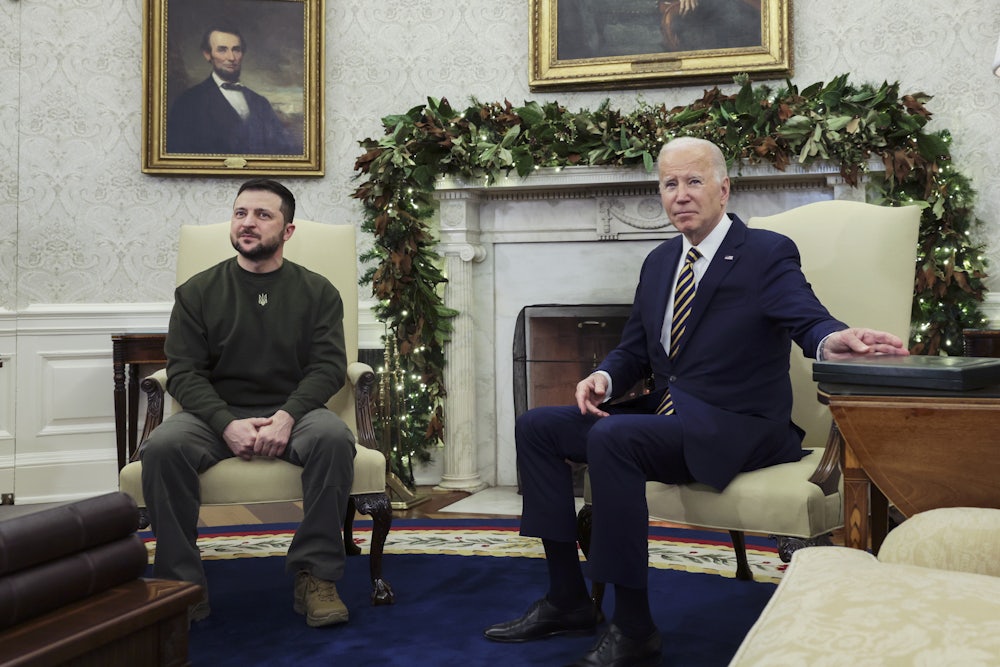The State of the Union address is perhaps the most overly planned, meticulously scripted, and boringly predictable event on the political calendar.
In his speech to Congress on Tuesday night, Joe Biden is certain to crow—with much justice—about the 517,000 new jobs created in January and the lowest unemployment rate since Richard Nixon’s early days in the White House. The president undoubtedly will make headlines with his comments on the debt ceiling fight, even though the true confrontation with Republican recklessness is still months away. There will be the comic teeter-totter pageantry behind Biden as Kamala Harris continually rises to offer fervent applause while Kevin McCarthy sits glowering.
But in historic terms, none of these gambits or gimmicks will be nearly as important as what Biden says about the war in Ukraine.
American support for continued military and financial backing for Volodymyr Zelenskiy’s efforts to repel the Russians invaders is eroding, according to recent polls. Some of this backsliding is inevitable in a short-attention-span superpower where even pandemics quickly become boring. And some of the decline in support is due to the loud isolationist chorus on the Trumpian right; as America Firsters in a different era would have asked, “Why not give Hitler Czechoslovakia? What could go wrong?”
When Biden delivered his first State of the Union in early March of last year, Vladimir Putin’s invasion was just six days old. At a time of widespread fears that the Russian flag would soon be flying over Kyiv, Biden forcefully declared that Putin had “badly miscalculated. He thought he could roll into Ukraine and the world would roll over. Instead, he met with a wall of strength he never anticipated or imagined. He met the Ukrainian people.”
Biden was right—and one of the glittering successes of his administration so far has been his handling of the American response to the biggest land war in Europe since 1945. But with the war in an apparent winter stalemate, the tropes about the bravery of the Ukrainian troops have grown tired. And the rhetoric about democracy and freedom have become shopworn through constant repetition. After Zelenskiy’s emotional in-person appeal to Congress just before Christmas, there is little more that the former actor who morphed into the twenty-first-century version of Winston Churchill can do to dramatize the righteousness of his nation’s cause.
A national poll by the Pew Research Center released last week found that 40 percent of Republicans and GOP-leaning independents now believe that America is providing “too much” support for Ukraine. In contrast, only 15 percent of Democrats and leaners feel that way. This finding is similar to a late-January Marquette Law School Poll that discovered that 47 percent of Republicans and just 14 percent of Democrats are in the “too much support” camp. What makes these numbers striking is that in the early Ukrainian-flag-waving days of the war, there was near-universal support—without major differences between Democrats and Republicans—for forceful action to help the Kyiv government repel the Russian invaders.
Biden does have important GOP allies in his efforts to continue giving strong military aid—now including advanced Abrams tanks—to Ukraine. Mitch McConnell, when he isn’t wielding the filibuster and trying to eviscerate domestic spending, is an old-fashioned Ronald Reagan hawk on Russia. When it comes to Ukraine, McConnell is the antithesis of McCarthy’s eager embrace of the what’s-wrong-with-Putin-anyway wing of the GOP.
What Biden needs to do Tuesday night is to take the time to play explainer in chief. A State of the Union is that rare moment when a president has the time and the platform to embark on an in-depth discussion of foreign policy. The moment can be misused—most notably by George W. Bush unveiling “the axis of evil” and setting the groundwork for the Iraq War in his 2002 speech. But a president could also hit the right note, as Biden did on Ukraine last year.
This is not an appeal to Biden’s speechwriters to come up with a compelling new metaphor or stirring emotional argument to sell the Ukrainian war to its skeptics. Instead of oratorical tricks, Biden should sketch out in clear fashion the strategic implications for America if Putin eventually were to succeed in his drive to swallow large chunks of Ukrainian territory. Such a presidential chalk talk would also outline the dire implications for the Baltic states—Lithuania, Latvia, and Estonia, all NATO members—if Putin were not deterred in Ukraine. Biden could also explain how comparatively modest the $113 billion that America has appropriated for Ukraine in 2022 looks against the backdrop of the $31 trillion national debt and the astronomical costs if America were obligated by treaty to come to the direct military aid of a NATO ally.
There is the understandable temptation in the Biden White House to believe that there is no need to devote more than a handful of paragraphs to Ukraine in the State of the Union. The ingredients are obvious: words of praise for Zelenskiy, a surprise Ukrainian guest sitting with Jill Biden in the balcony, and concluding with a few lines underscoring the president’s resolve.
If Ukraine does prove to be merely the ninth- or eleventh-biggest item in the president’s speech, an opportunity will be lost. And the fear is that support for resisting Putin’s war of Russian aggression will continue its slow slide into the danger zone.






